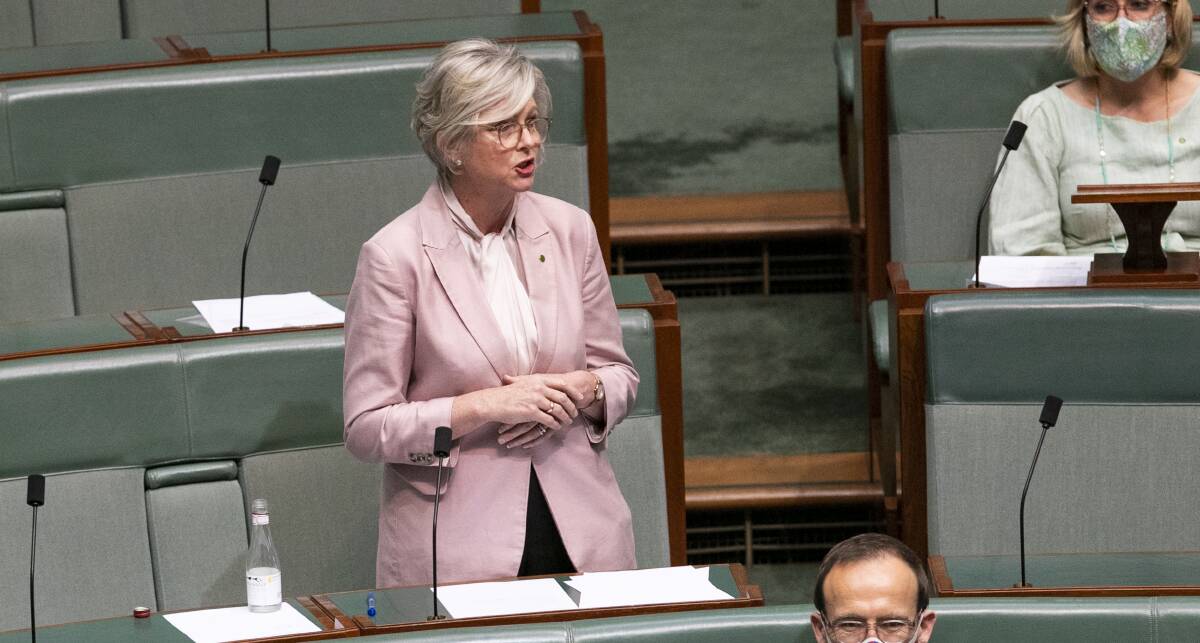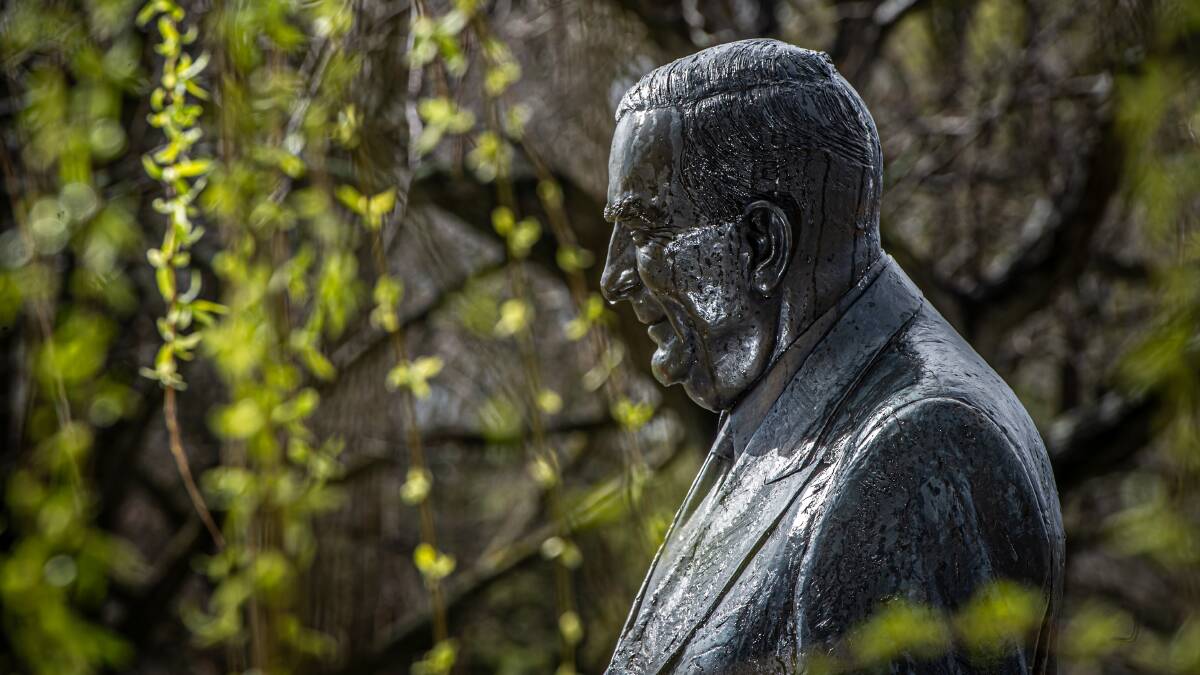
On thinking of the shaping influence of liberalism in Australia two names stand out for me - Sir Robert Menzies and Alan Missen, both founding members of the Liberal Party and symbolic of a roomy spirit absent in today's politics.
Subscribe now for unlimited access.
or signup to continue reading
Just a few months old when Menzies retired as Australia's longest serving prime minister in 1966, I did not meet him but feel connected nonetheless as the Sir Robert Menzies Scholar to Harvard in 1991-1992 and later chairing the scholarship's selection committee administered by the Australian National University.
A more important impact was the small 'l' imprint of his legacy and the ethos of tolerance accompanying it. Being 20 when Alan Missen died in 1986, I certainly witnessed his legacy. My closest brush with him came in my teens - his wife Mollie Missen was an adjudicator when I was chosen to represent Victoria in the National Schools State Debating Team. Alan was a likely fixture at those school debates, as he had met Mollie through the Debaters' Association of Victoria, a nugget mined in my dear friend - the much-mourned Anton Hermann's - biography of Missen. Former Labor senator John Button debated against both and rated Missen as very good "but not half as good as Mollie, who was terrifying - really!" With this history in mind, I have been thinking of Menzies and Missen in a time of COVID, reflecting on the perturbance of their liberal spirits by the government's unfurling of the pandemic response under the party banner.
Of course, these two liberal figures didn't always agree. In 1951, Menzies strayed from his founding liberal ideals. Missen opposed the referendum proposal to outlaw the Communist Party of Australia. Missen's article in The Argus that year objected to the use of totalitarian methods restricting traditional freedoms in a democratic country. The referendum failed and the lesson was learned. Thus, I don't think it is too audacious to think both Menzies and Missen would have objected to the absolute ban on Australians leaving Australia without an exemption and the limitations on their return. I can hear them advocating for the federal government using its quarantine powers to build purpose-built quarantine centres around the country. This ready power sat at the feet of the government, a proportionate measure to ensure the rights of Australians everywhere were protected - so freedom of movement could sit well with maintaining national COVID health.
It is actually around the health of our democratic nation, and the demise of significant national democratic institutional structures and conventions, where I can see the spirits of Menzies and Missen wandering like the old king in the putrid Danish fog, speaking up in their party room against some of the steps taken by successive governments.
The liberal vision of an open and transparent government was central to Missen's commitment to introducing freedom of information legislation. The objects and purpose of FOI affirm Parliament's intention "to promote Australia's representative democracy by contributing toward increasing public participation in government processes", with a view to "promoting better-informed decision-making; to increasing scrutiny, discussion, comment and review of the government's activities" with a reminder too that Parliament also intends "to increase recognition that information held by the government is to be managed for public purposes, and is a national resource".

True to this liberal ethos, other mechanisms protecting the health of our democratic framework evolved from 1970s and 1980s democratic reforms, through recommendations from the Commonwealth Administrative Review Committee. The "new administrative law" package included the Administrative Appeals Tribunal (AAT) Act, which set up the AAT to be an independent body reviewing government decisions impacting squarely on people's lives and liberties, and the Administrative Review Council, a body that reported to government about measures to maintain the nation's democratic health through administrative law. The national Ombudsman and the introduction of a more streamlined mechanism of challenging Commonwealth government decisions in the courts through the Administrative Decisions (Judicial Review) (ADJR) Act were also important additions to accountability and transparency. So many of these elements have been diminished by various governments.
The Administrative Review Council which was chaired by eminent lawyers including Professor Cheryl Saunders and Justice Susan Kenny, and produced over 50 reports, was discontinued in 2015 and its functions were consolidated into the Attorney-General's Department. The Minister for Finance, then senator Mathias Cormann, announced this as part of the May 2015 Smaller Government reforms, and in this case smaller government means less commitment to strong systems of review and accountability.
No wonder there are anguished voices pressing for a federal independent body to protect against corruption.
So too have changes to the AAT diminished accountability. In 2018, the Hon. Ian Callinan AC QC, former Justice of the High Court of Australia, reviewed the AAT. Among many concerns, Callinan included a direct censure to the appointment process which has seen many former politicians and staffers qualified largely by their Liberal Party connections chosen as AAT members. Callinan recommended "[a]ll further appointments, re-appointments or renewals of appointment to the membership of the AAT should be of lawyers, admitted or qualified for admission to a Supreme Court of a state or territory or the High Court of Australia, and on the basis of merit". The Commonwealth Ombudsman's jurisdiction has also been significantly diminished. As Anita Shmeuke wrote in September, "[w]e have arrived near the point at which the Commonwealth Ombudsman institution is transformed so much that it risks credibility in stating that its primary purpose is the protection of the interests and rights of an individual citizen".
And so, we see successive changes wearing down the structures necessary to protect and ensure our representatives are accountable to those who elect them. It must be unfathomable to true liberals in the Menzies and Missen mould to see the erosion of structures so foundational to embedding a culture of respect and humility in those who hold power. No wonder there are anguished voices pressing for a federal independent body to protect against corruption. Elected representatives who feel entitled to spend taxpayers' money to promote their holding of power rather than what is in the best interests of the country is directly at odds with the Menzies and Missen vision of holding power on trust for the community. Core to this trust is protecting the liberal democratic institutions and structures protecting individuals in a liberal democracy and ensuring the proper balancing of the needs of individuals and the whole community.
Helen Haines' bill to establish the Australian Federal Integrity Commission is a much stronger blueprint than this government's proposed Commonwealth Integrity Commission. The AFIC is fully equipped with powers to ensure our representatives act honestly and with integrity and with appropriate checks and safeguards to protect the integrity of its work. Haines' AFIC bill has the support of judges, ethicists, legal academics, law-enforcement organisations, civil-society leaders, and MPs.
In a liberal democracy, institutions and conventions - including ministerial responsibility - are central to embedding a culture of accountability and transparency in the exercise of power. For accountability and transparency are foundational to recognising that power held by government is on trust for the people. It is time to reinstate and bolster FOI legislation, ensure AAT appointments are made by an independent, arms-length process, and to properly resource a well-staffed ARC and Ombudsman to do their jobs. These measures will entrench the democratic culture and conventions needed for the health of our democracy. To fully vaccinate our democracy in this way will make an AFIC less busy, although a necessary last resort when our representatives falter.
These vital measures seem undreamt of in the philosophies of our current leaders, but they were well understood by those two liberal ghosts walking the graveyards of their once grand old party.
- Professor Kim Rubenstein is co-director of the 50/50 by 2030 Foundation and a member of the Faculty of Business Government and Law at the University of Canberra. She has announced she will run as an independent in the Senate at the next federal election.

